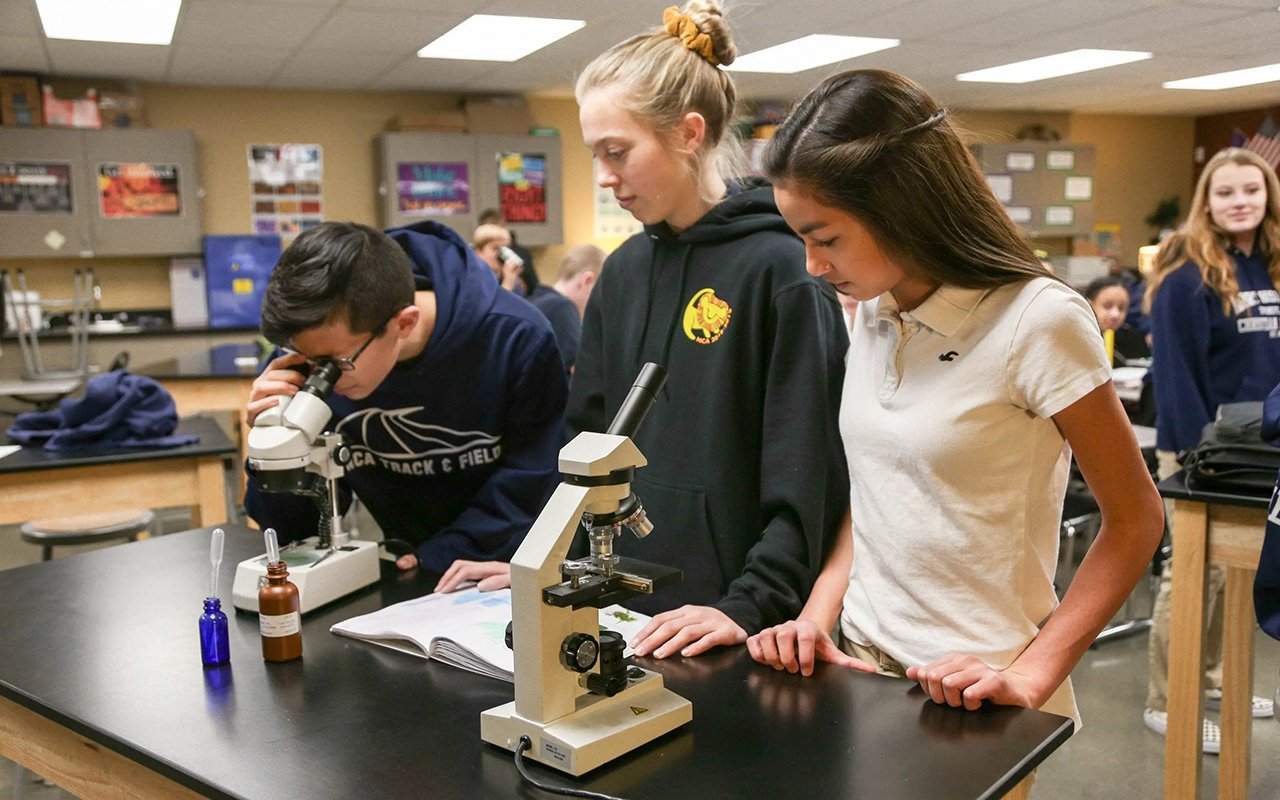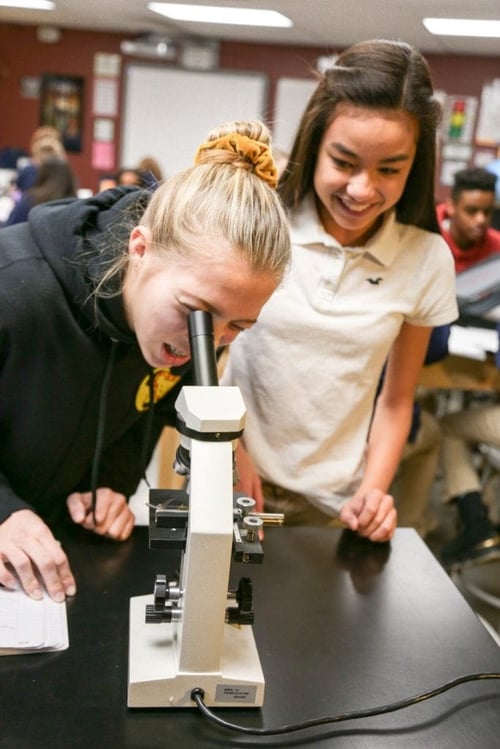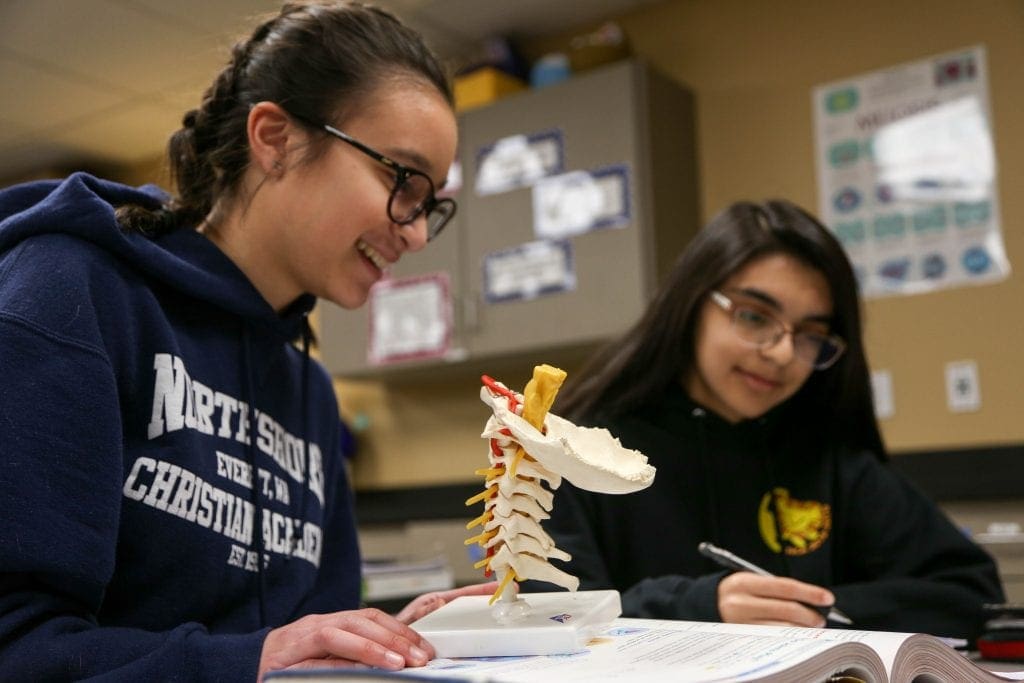
A Brief Interview with Mary DeCracker, Middle School Teacher at Northshore Christian Academy
Mary DeCracker oversees the Northshore Christian Academy (NCA) 8th-grade science program in Everett, Washington. As a teacher and curriculum designer, she is deeply passionate about STEM — science, technology, engineering, and math education — in a Christian context.
Mary, will you introduce yourself?
I grew up on 300 acres outside of San Diego. I frequented the ocean and learned to love being outside, exploring God’s creation. I moved to Seattle at 16 to attend Seattle Pacific University. Yep, I was young, but I was ready to start that adventure! I studied science and earned degrees in biology, chemistry, and physics! Yes, total nerd here, but I will tell you – doing what you love makes all the difference for my students. I truly love science!
I started teaching in 2008. I started out teaching and designing an inquiry-based curriculum at Lakeside School and then moved onto work in other independent schools in the greater Seattle area, ultimately arriving at NCA in 2018. At NCA I am excited from 8 am till dismissal, when you are sure to hear me announcing names at the end of the day! That excitement feeds into everything I do – science teaching included.
At NCA, I am a part of our leadership team in middle school. Overseeing science and the 8th-grade team, we work together to make sure you are continually growing in knowledge academically and socially maturing as well. I work alongside other teachers from across the grade levels and specialties to create a truly unique culture!
I think God can be seen in so many parts of our world around us and those observations we make are science at work in our everyday lives. From the season changes to the weather, we observe it all. When you come to learn that these things we see and feel are designed to draw us to a Creator, why wouldn’t you want to spend time in this area of education at a Christian school? I have the absolute BEST job!
What are your views on science in middle school?
Science in middle school should be exciting! From lighting your hands on fire to understanding why we all know corn doesn’t actually get used by our bodies… yeah, you know what I mean, science should be exciting. If science isn’t exciting, why spend time studying it?
Middle school science should also be challenging. Topics should not have easy answers to discover. The journey to discovery is where the excitement takes place.

Why is science important in middle school?
Science is important in middle school because we all are explorers at heart, searching for answers for scientific and other general questions. In middle school, our bodies are changing and our ideas are changing and we are starting to question what we know. Middle School science is all about answering the questions we’ve never thought to ask—things like, ‘why does that magnet stick to the refrigerator?’, ‘Why does baking soda bubble sometimes?’, and ‘Why does my body start to smell in middle school?!’
What has been your experience as a middle school teacher at Northshore Christian Academy?
NCA is a unique place to teach and learn. As a teacher at NCA, you are a learner just as much as you are a teacher. We work across the 6th, 7th, and 8th grades to ensure that we are increasing both the understanding and difficulty of subject material. We also try and make sure that each student will be exposed to enough different types of science that they will be successful wherever they go into high school, regardless of the freshman classes they take.
How do you prepare students for high school while they are in middle school?
We prepare students by creating a solid foundation across multiple disciplines in science, students truly leave NCA ready to achieve and are actually successful in their high school science classes. We spend time on root words since, although they are sometimes viewed as boring, they truly open doors to understanding what is going on in the world around us.
Tell me about science now vs. where it is going in the future.
Science is an active subject. When I was young, learning involved reading, writing and a little bit of doing. Today, science learning is reversed. We do … and we do everything. Experiment, manipulate variables, draw, design, go and see (yes – we go outside!), and well, we just do! Reading and writing accompany the action, and that is a great way to learn. Now, with VR technologies, we are headed out to adventures in far off places. Our opportunities are truly endless.
How do you integrate God’s truth into the science classroom and how does this differ from public school?
God’s truth is seen throughout the world of science. We as people have all been given senses, which allow us to see, hear, feel, touch, taste… and these are for exploring and answering questions regarding our surroundings. We know from Genesis 1 and 2 that God created these things for us. We have much to learn!
As we learn about magnetism and gravity and the way the earth is located geographically in the perfect location in our universe, it is hard to not see a design, and intentional design at that! We explore how chemicals and elements found on earth have allowed us to create technologies that have opened doors to learning more and more about the details of God’s creations, way beyond what the eyes can see on their own. Finally in life science, we learn how all of life is created to point people to an all-knowing, good and gracious God, one who has designed the perfect life for us to live intentionally in all the ways that He has commanded us to in His word.
In science, we have confidence in knowing that we were created to partner in stewardship with an all-knowing God. That sure brings some confidence to this existence! Stewarding does not only mean preserving, but learning. This partnership in stewarding is a way we are very different from public education. While science may be science, we know why science is working, and who it is reflecting. In this sometimes chaotic life, we can find peace knowing God has created each atom to bring and remind people of His creation and His perfect will.
Describe the hands-on experiments and projects in science classes.
From building magnets and motors to learning about salt crystals and, well, bodies, we have a variety of investigations and experiments throughout middle school. We start by investigating magnetism and gravity and learn how those naturally occurring phenomena also change chemicals and elements. We learn how to alter the temperature of substances without using heat. We chart graphs to see outliers and learn to read and interpret graphs in each grade level.
We grow plants, learning how important proper nutrition is. We dissect a few specimens each year to see the intentional design inside our body to work collaboratively across each of the body systems.

Talk to me about how science is integrated into middle school and complements the other core classes.
Science is integrated across middle school through mathematics, English, and history. We study and learn Greek and Latin root words as an easy way to learn to identify words that may be unfamiliar. We use math to help us calculate differences we are seeing experimentally and to help us predict what should be happening. We also benefit from those who have created tools for us to use today.
How do you help teach the whole child beyond just academics?
By teaching, no, by igniting this desire to answer questions, students are transformed by their experience in science at NCA. We pose questions that require long-term investigation and long-term attention by students who will carry these thoughts with them far beyond their experience at NCA. Most importantly, however, we teach that each of the individual experiences with the world around them are all interactions with a God who loves and cares for them deeply. The beauty they experience on a snow day and the summertime lake days, all point back to a creator who designed intentionally, with them in mind.
Talk about skills learned in NCA’s middle school: study skills, public speaking, and leadership.
In science, students work in teams and learn to collaborate. We learn together that each person around you shares a unique perspective. These perspectives should be shared and should be discussed to jointly come to the best working model, or decision, one can make. Individuals rotate jobs in these groups, leader today, technician tomorrow, and ultimately, they learn the skills not only required to create a team but to see one through till the job is complete.
Watch our interview with Mrs. DeCracker!
Recent Posts
Explore categories
Visit NCA:
Request a Tour Today!
Northshore Christian Academy is known for more than just our amazing curriculum, we also have one of the most incredible private school campuses in Washington State. See it for yourself.


%201.png?width=1286&height=371&name=logo-30th-anniversary%20(1)%201.png)





